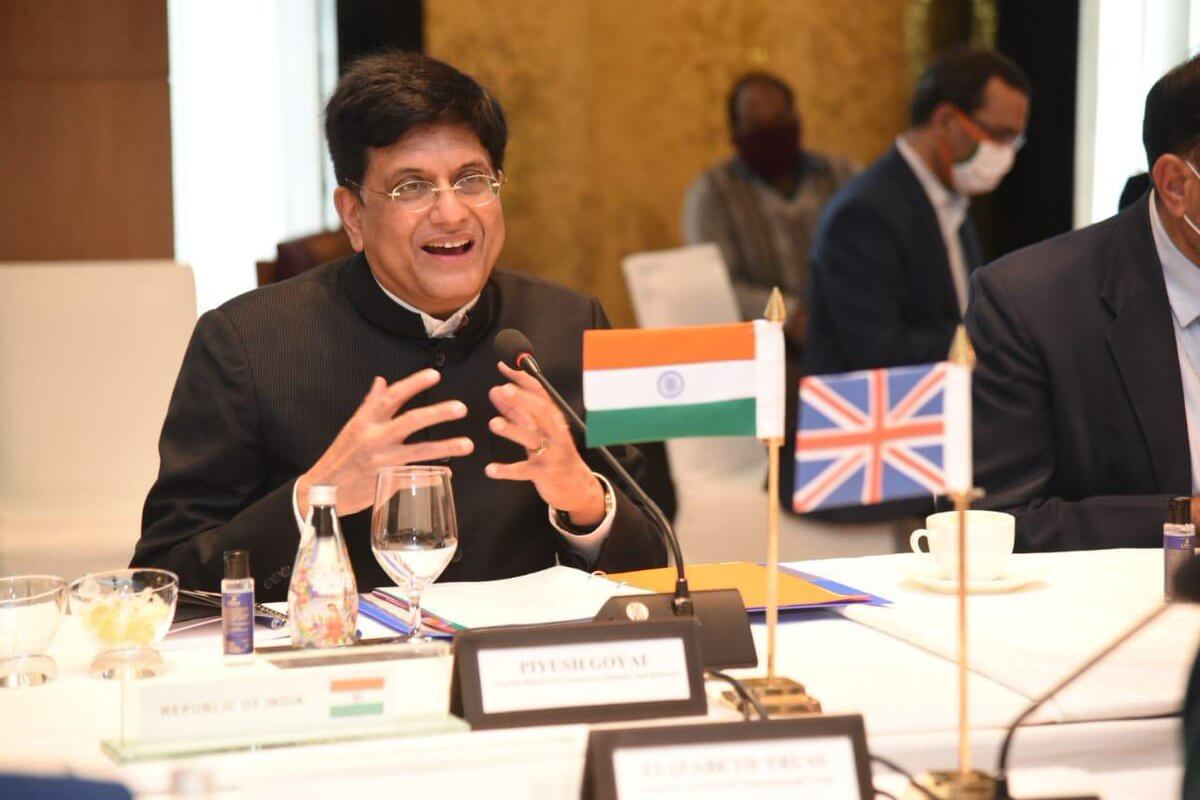On Monday, as a part of her four-day visit to India, British Secretary of State for International Trade Elizabeth Truss met with Indian Minister of Commerce and Industry Piyush Goyal. During their discussion, the two leaders spoke about working towards an “enhanced trade partnership” between the United Kingdom (UK) and India. In an interview following the discussion, Truss said that the two sides agreed to set up working groups to further this aim. She added that “deeper trade relations” between India and the UK are “absolutely a priority.” Through the “enhanced trade partnership”, she said that India and UK aim to “remove barriers to trade”.
The Indian Ministry of Commerce, too, released a statement celebrating the discussion. The statement read, “Taking forward their commitment from the 14th Joint Economic Trade Committee (JETCO) on July 24, 2020, India and UK Trade Ministers reviewed the ongoing engagements between the two sides for an [Economic Trade Partnership], as part of the development of a roadmap that would lead to a potential comprehensive [Free Trade Agreement], including considerations on an interim agreement on a preferential basis.”. Further, it declared that the “enhanced trade partnership” would be formally launched during British Prime Minister Boris Johnson’s visit to India.
This comes as the UK looks to establish closer trade ties with its allies following its exit from the European Union (EU). One of the consequences of Brexit is that it will now be able to enter into such bilateral trade deals with countries across the globe, including India, which is one of the EU’s leading trade partners. Moreover, this will actually benefit the UK’s Free Trade Agreement negotiations with India, as several difficult issues that have held back India’s trade discussions with the EU, such as dairy products, agricultural produce, and automobiles, no longer impact the UK. Such agreements will help the UK in reducing the combined impact of Brexit and the COVID-19 pandemic on the British economy. In this pursuit, India will be a significant partner, with bilateral trade between the two countries hitting $15.45 billion during the financial years of 2019-2020.
Meanwhile, India is seeking to simultaneously reopen trade and investment negotiations with the EU. During a virtual meeting with the bloc’s Trade Commissioner, Valdis Dombrovskis, Commerce Minister Piyush Goyal called for an “early-harvest deal”. This, he said, would further the two sides’ vision of a “bound and balanced Free Trade Agreement.” A statement by the EU also looked at these discussions optimistically, saying, “Indian Trade Minister Piyush Goyal and Executive Vice-President Valdis Dombrovskis reiterated their interest in resuming negotiations for ambitious, comprehensive, and mutually beneficial trade and investment agreements once their respective approaches and positions are close enough.” It added that, in the meantime, both sides are looking at alternative approaches to further cooperation.
India’s vision to secure a Free Trade Agreement with the EU has been a challenging negotiation to conclude. While both the EU and India have expressed the importance of such a deal since 2007, the conversation has been halted since 2013. There are several issues that the two disagree on. The EU has previously complained that the Indian side refuses to adequately open up its automobiles and wine and spirits market. Further, India has shown resistance to allowing European firms access to its financial sector, specifically for “banking, insurance, and e-commerce”. The EU’s insistence on including issues such as labour regulations and environmental laws into the FTA is also unacceptable to India. In the past, these have proven to be points of major contention between the two parties. However, due to the importance of the European market, India has held stand-alone summits with Norway, Switzerland, Luxembourg, Denmark, and Italy to push for economic partnerships at the bilateral level.
However, the two sides’ efforts to secure a trade deal have seen a renewed push over the past year. Less than a month ago, Indian Foreign Secretary Harsh Vardhan Shringla met with the Ambassadors of the member states of the European Union (EU) to discuss the upcoming India-EU+27 Leaders’ Summit, which is scheduled to take place in May. The spokesperson of the Indian Ministry of External Affairs (MEA), Anurag Srivastava, calling the EU a “natural partner” of India, said that the leaders further discussed “trade, investments, climate change, and Indo-Pacific.”
Ugo Astuto, the European Union’s Ambassador to India, added that multilateralism, global health, digitisation, and connectivity also featured in last month’s talks. The discussions in May are likely to further both sides’ vision of achieving the long-overdue Free Trade Agreement.
Both these negotiations are crucial as the EU and the UK collectively account for 17% of India’s outbound shipments. Meanwhile, with exports from the UK to EU down by 68% since Brexit, enhancing trade and investment ties with allies like India has also gained a renewed importance for the two European blocs.
UK Looks to Bolster Trade Ties With India Amid Continued Post-Brexit Slowdown
Still struggling to cushion the impact of Brexit, British Secretary of State for International Trade Liz Truss spoke with her Indian counterpart about signing an “enhanced trade partnership.”
February 9, 2021

SOURCE: TWITTER
